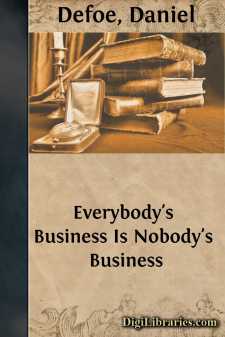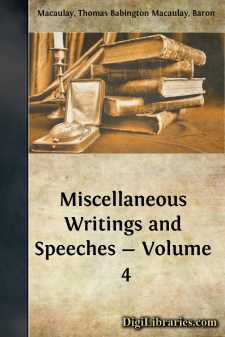Literary Collections
- American 84
- Ancient, Classical & Medieval 14
- Asian 1
- Australian & Oceanian 1
- Canadian 55
- Continental European 121
- English, Irish, Scottish, Welsh 179
- Essays
- General 24
- Letters 46
- Middle Eastern 1
Essays Books
Sort by:
by:
Jenny Wren
CHAPTER I. ON LOVE."Love is of man's life a thing apart;'Tis woman's whole existence."So sings the poet, and so agrees the world. Humiliating as it is to make the confession, it is undeniably true. "Men and Dress are all women think about," cry the lords of creation in their unbounded vanity. And again, we must submit—and agree—to the truth of the accusation; at any...
more...
THERE'S PIPPINS AND CHEESE TO COME There's Pippins and Cheese To Come In my noonday quest for food, if the day is fine, it is my habit to shun the nearer places of refreshment. I take the air and stretch myself. Like Eve's serpent I go upright for a bit. Yet if time presses, there may be had next door a not unsavory stowage. A drinking bar is nearest to the street where its polished...
more...
by:
Charles Cotton
I never yet saw that father, but let his son be never so decrepit or deformed, would not, notwithstanding, own him: not, nevertheless, if he were not totally besotted, and blinded with his paternal affection, that he did not well enough discern his defects; but that with all defaults he was still his. Just so, I see better than any other, that all I write here are but the idle reveries of a man that...
more...
Our theme for the hour is the American Newspaper. It is a subject in which everybody is interested, and about which it is not polite to say that anybody is not well informed; for, although there are scattered through the land many persons, I am sorry to say, unable to pay for a newspaper, I have never yet heard of anybody unable to edit one. The topic has many points of view, and invites various study...
more...
by:
John Burroughs
EMERSON AND HIS JOURNALS I Emerson's fame as a writer and thinker was firmly established during his lifetime by the books he gave to the world. His Journals, published over a quarter of a century after his death, nearly or quite double the bulk of his writing, and while they do not rank in literary worth with his earlier works, they yet throw much light upon his life and character and it is a...
more...
by:
Daniel Defoe
THE PREFACE Since this little book appeared in print, it has had no less than three answers, and fresh attacks are daily expected from the powers of Grub-street; but should threescore antagonists more arise, unless they say more to the purpose than the forementioned, they shall not tempt me to reply. Nor shall I engage in a paper war, but leave my book to answer for itself, having advanced nothing...
more...
by:
Charles Cotton
It is very easy to verify, that great authors, when they write of causes, not only make use of those they think to be the true causes, but also of those they believe not to be so, provided they have in them some beauty and invention: they speak true and usefully enough, if it be ingeniously. We cannot make ourselves sure of the supreme cause, and therefore crowd a great many together, to see if it may...
more...
A NIGHT IN THE GARDEN OF THE TUILERIES It was in the time of the Second Empire. To be exact, it was the night of the 18th of June, 1868; I remember the date, because, contrary to the astronomical theory of short nights at this season, this was the longest night I ever saw. It was the loveliest time of the year in Paris, when one was tempted to lounge all day in the gardens and to give to sleep none of...
more...
by:
Ralph Bergengren
THE PERFECT GENTLEMAN Somewhere in the back of every man's mind there dwells a strange wistful desire to be thought a Perfect Gentleman. And this is much to his credit, for the Perfect Gentleman, as thus wistfully contemplated, is a high ideal of human behavior, although, in the narrower but honest admiration of many, he is also a Perfect Ass. Thus, indeed, he comes down the centuries—a sort of...
more...
PREFACE. It was most reluctantly that I determined to suspend, during the last autumn, a work which is the business and the pleasure of my life, in order to prepare these Speeches for publication; and it is most reluctantly that I now give them to the world. Even if I estimated their oratorical merit much more highly than I do, I should not willingly have revived, in the quiet times in which we are so...
more...











